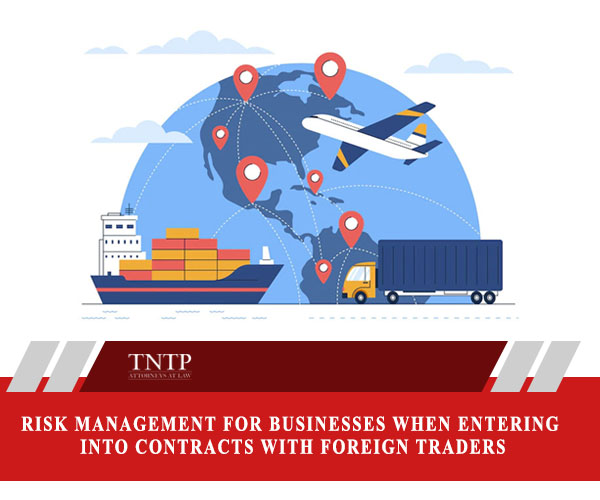With the trend of integration and opening the economy, Vietnam has continuously signed new-generation free trade agreements. Since then, Vietnamese businesses have many opportunities to make transactions with foreign traders. However, many domestic enterprises are still at risk when entering contracts for sale and purchase of goods with foreign traders. So, what risk management measures for businesses when signing purchase and sale contracts with foreign traders? In part 1 of this topic, TNTP will analyze the notes on subjects and forms when signing the Contract.
I. Overview of commercial contracts with foreign elements
According to Article 1 of the 1980 Vienna Convention on the International Sale of Goods, an international contract for the sale of goods is a contract entered between parties having commercial offices in different countries. According to Clause 1, Article 27 of the 2005 Commercial Law (“Law on Trade”), “International purchase and sale of goods shall be conducted in form of export, import, temporary import for re-export, temporary export for re-import and transfer through border-gates”. In particular, the most variable is the import-export relationship, whereby a party called the Exporting Party is obliged to deliver goods and transfer ownership of goods to another party called the Importing Party and receive payment; and the Importing Party is obliged to pay the Exporting Party, receipt of goods and ownership of goods as agreed upon.
II. Notes when drafting the International Trading Contract
1. Risk management when determining the authority of the subject to sign the Contract
Currently, many Vietnamese enterprises have contract disputes with foreign traders stemming from the reason of carefully checking their legal status and signing contracts with the wrong authority.
According to Vietnamese law, only the legal representative or the person legally authorized by the legal representative has the authority to sign the Contract. If the company has more than one legal representative, the company’s charter usually specifies the rights and obligations of each legal representative, including the authority to sign the Contract. In contrast, for example, UK law does not have specific provisions for authorization. UK case law recognizes implicit authorization, meaning that an executive, when performing the duties of running a company, has the right to perform the work of the chief executive who normally does so a power of attorney may not be required.
Thus, when entering into contracts with foreign traders, Vietnamese enterprises need to learn the regulations on the competence and authorization of the partner country, and at the same time request the partner to provide documents to prove or commit that the partner has the authority to sign the Contract. Some types of documents that Vietnamese enterprises should require partners to provide include but are not limited to documents proving operation history, business licenses and legal documents related to legal entities.
2. Risk management of contract form
Currently, many states that are parties to the 1980 Convention stipulate that the form of contract is not necessarily a written document, the parties can use the non-written form.The1980 Convention provides: “A contract of sale must not be entered into in writing or confirmed in writing or subject to any other requirement in the form of the Contract, the Contract may be substantiated in any way, including witness testimony.”
Vietnam acceded to the Vienna Convention 1980 in 2015 but reserved provisions on the form of contracts. Therefore, in Clause 2, Article 27 of the Commercial Law: “International purchase and sale of goods shall be conducted on the basis of written contracts or other forms of equal legal validity”. As such, internationally recognized contracts for sale and purchase of goods are effective when expressed in writing, as well as any additional changes that must be made in writing.
In Vietnamese laws as well as international practices, international trade contracts are often prescribed to be established in written form. Forms of equivalent legal validity include email, telegraphy, telex, fax, data messages and others as prescribed by law. At the present time, Vietnamese law has recognized contracts signed in the form of digitalization, online purchase, fax, email, etc. have legal validity as written form.
In the contract, Vietnamese enterprises need to learn the laws of the family that will govern the implementation and settlement of disputes related to the Contract to choose the legal form of contract. Because, if the parties enter the Contract in a non-written form such as words and acts, … but if the governing law of the Contract is Vietnamese law, the Contract is considered a violation of the provisions on form.
If the Contract is breached in form, the Court of Vietnam or arbitration in Vietnam may declare the Contract invalid. If the parties enter an international contract, the parties should draft a written contract because the contents will be clearly expressed, convenient for the parties to perform the Contract and an important basis for dispute settlement (if any).
Above is part 1 of the article “Risk management for enterprises when entering into contracts with foreign traders”. Hope this article will help readers. Other important notes TNTP will cover in the next sections.
Sincerely,








